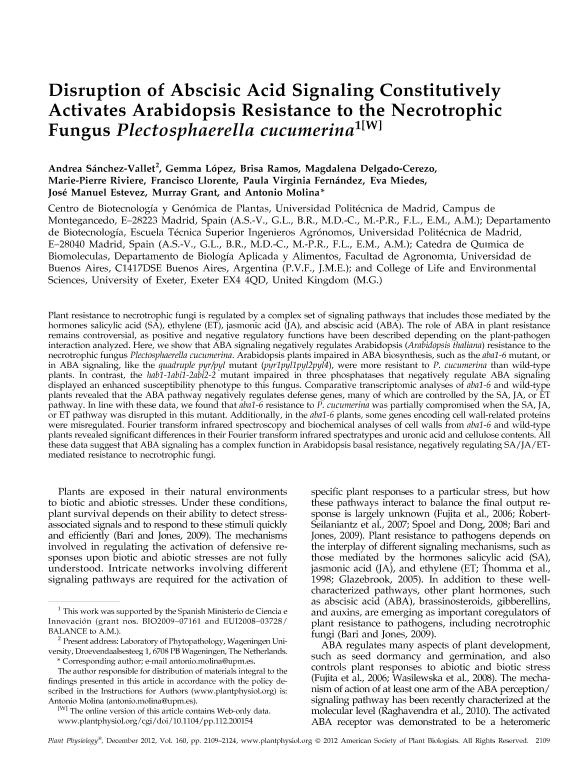Mostrar el registro sencillo del ítem
dc.contributor.author
Sánchez Vallet, Andrea
dc.contributor.author
López, Gemma
dc.contributor.author
Ramos, Brisa
dc.contributor.author
Delgado Cerezo, Magdalena
dc.contributor.author
Riviere, Marie Pierre
dc.contributor.author
Llorente, Francisco
dc.contributor.author
Fernández, Paula Virginia

dc.contributor.author
Miedes, Eva
dc.contributor.author
Estevez, Jose Manuel

dc.contributor.author
Grant, Murray
dc.contributor.author
Molina, Antonio
dc.date.available
2019-01-21T17:16:37Z
dc.date.issued
2012-12
dc.identifier.citation
Sánchez Vallet, Andrea; López, Gemma; Ramos, Brisa; Delgado Cerezo, Magdalena; Riviere, Marie Pierre; et al.; Disruption of abscisic acid signaling constitutively activates Arabidopsis resistance to the necrotrophic fungus Plectosphaerella cucumerina; American Society of Plant Biologist; Plant Physiology; 160; 4; 12-2012; 2109-2124
dc.identifier.issn
0032-0889
dc.identifier.uri
http://hdl.handle.net/11336/68284
dc.description.abstract
Plant resistance to necrotrophic fungi is regulated by a complex set of signaling pathways that includes those mediated by the hormones salicylic acid (SA), ethylene (ET), jasmonic acid (JA), and abscisic acid (ABA). The role of ABA in plant resistance remains controversial, as positive and negative regulatory functions have been described depending on the plant-pathogen interaction analyzed. Here, we show that ABA signaling negatively regulates Arabidopsis (Arabidopsis thaliana) resistance to the necrotrophic fungus Plectosphaerella cucumerina. Arabidopsis plants impaired in ABA biosynthesis, such as the aba1-6 mutant, or in ABA signaling, like the quadruple pyr/pyl mutant (pyr1pyl1pyl2pyl4), were more resistant to P. cucumerina than wild-type plants. In contrast, the hab1-1abi1-2abi2-2 mutant impaired in three phosphatases that negatively regulate ABA signaling displayed an enhanced susceptibility phenotype to this fungus. Comparative transcriptomic analyses of aba1-6 and wild-type plants revealed that the ABA pathway negatively regulates defense genes, many of which are controlled by the SA, JA, or ET pathway. In line with these data, we found that aba1-6 resistance to P. cucumerina was partially compromised when the SA, JA, or ET pathway was disrupted in this mutant. Additionally, in the aba1-6 plants, some genes encoding cell wall-related proteins were misregulated. Fourier transform infrared spectroscopy and biochemical analyses of cell walls from aba1-6 and wild-type plants revealed significant differences in their Fourier transform infrared spectratypes and uronic acid and cellulose contents. All these data suggest that ABA signaling has a complex function in Arabidopsis basal resistance, negatively regulating SA/JA/ET- mediated resistance to necrotrophic fungi.
dc.format
application/pdf
dc.language.iso
eng
dc.publisher
American Society of Plant Biologist

dc.rights
info:eu-repo/semantics/openAccess
dc.rights.uri
https://creativecommons.org/licenses/by-nc-sa/2.5/ar/
dc.subject
Arabidopsis
dc.subject
Aba
dc.subject
Cell Wall
dc.subject.classification
Otras Ciencias Biológicas

dc.subject.classification
Ciencias Biológicas

dc.subject.classification
CIENCIAS NATURALES Y EXACTAS

dc.title
Disruption of abscisic acid signaling constitutively activates Arabidopsis resistance to the necrotrophic fungus Plectosphaerella cucumerina
dc.type
info:eu-repo/semantics/article
dc.type
info:ar-repo/semantics/artículo
dc.type
info:eu-repo/semantics/publishedVersion
dc.date.updated
2019-01-16T18:12:06Z
dc.journal.volume
160
dc.journal.number
4
dc.journal.pagination
2109-2124
dc.journal.pais
Estados Unidos

dc.journal.ciudad
Rockville
dc.description.fil
Fil: Sánchez Vallet, Andrea. Universidad Politécnica de Madrid; España
dc.description.fil
Fil: López, Gemma. Universidad Politécnica de Madrid; España
dc.description.fil
Fil: Ramos, Brisa. Universidad Politécnica de Madrid; España
dc.description.fil
Fil: Delgado Cerezo, Magdalena. Universidad Politécnica de Madrid; España
dc.description.fil
Fil: Riviere, Marie Pierre. Universidad Politécnica de Madrid; España
dc.description.fil
Fil: Llorente, Francisco. Universidad Politécnica de Madrid; España
dc.description.fil
Fil: Fernández, Paula Virginia. Universidad de Buenos Aires. Facultad de Agronomía. Departamento de Biología Aplicada y Alimentos; Argentina. Consejo Nacional de Investigaciones Científicas y Técnicas; Argentina
dc.description.fil
Fil: Miedes, Eva. Universidad Politécnica de Madrid; España
dc.description.fil
Fil: Estevez, Jose Manuel. Universidad de Buenos Aires. Facultad de Agronomía. Departamento de Biología Aplicada y Alimentos; Argentina. Consejo Nacional de Investigaciones Científicas y Técnicas; Argentina
dc.description.fil
Fil: Grant, Murray. University of Exeter; Reino Unido
dc.description.fil
Fil: Molina, Antonio. Universidad Politécnica de Madrid; España
dc.journal.title
Plant Physiology

dc.relation.alternativeid
info:eu-repo/semantics/altIdentifier/doi/http://dx.doi.org/10.1104/pp.112.200154
dc.relation.alternativeid
info:eu-repo/semantics/altIdentifier/url/http://www.plantphysiol.org/content/160/4/2109
dc.relation.alternativeid
info:eu-repo/semantics/altIdentifier/url/https://www.ncbi.nlm.nih.gov/pmc/articles/PMC3510135/
Archivos asociados
